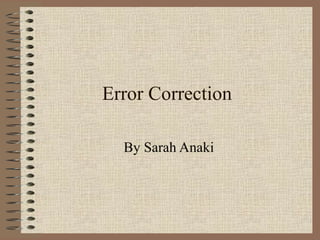
Error correction
- 1. Error Correction By Sarah Anaki
- 2. What’s The Difference Between Mistakes and Errors? Mistakes are when students produce incorrect language although they know the correct form. Errors are when students produce incorrect language because they don’t know the correct form. Students can usually correct their mistakes but by definition they can’t correct their errors.
- 3. Self Correction vs Peer Correction There are essentially three basic forms of :error correction 1. Self-correction Peer correction2. Teacher correction3.
- 4. Important Questions 1.Should learners’ errors be corrected? 2.When should learners’ errors be corrected? 3.Which errors should be corrected? 4.How should errors be corrected? 5.Who should do the correcting?
- 5. Speaking and Reading Types of Corrective Feedback: 1.Explicite correction.Clearly indicating that’s the student’s utterance was incorrect.The teacher provides the correct form. e.g: the coyote , the bison and the ….cr…crane.And the crane.we say crane.(phonological error(
- 6. 2.Recast.Without directly indicating that the student’s utterance was incorrect. The teacher implicitly reformulate the student’s error or provide the correction. e.g:”Maple sap?”Maple sap, good.(grammatical error( 3.Clarification request.By using phrases like” Excuse me ?” or “I don’t understand” the teacher indicates that the message has not been understood or that the student’s utterance contained some kind of mistake and that a repetition or a reformulation is required. e.g:”Can ,can I made a card on the …. for my little brother on the computer?” Pardon.
- 7. 4.Metalinguistic clues.Without providing the correct form. The teacher poses questions or provides comments or informations related to the formation of the student’s utterance. e.g:”Uhm,the,the elephant.The elephant growls.”Do we say the elephant?(Multiple errors) 5.Elicitation.The teacher directly elicits the correct form from the student by asking questions. e.g:”Well , there is a stream of perfume that doesn’t smell very nice.”So, a stream of perfume we call that a….?”
- 8. 6.Repetition. The teacher repeats the student’s errors and adjust intonation to draw student’s attention to it. e.g:”The….the giraffe?”The giraffe?”
- 9. Why doesn’t my teacher correct all my mistakes when I am speaking or reading? ‘t correct all your mistakes:Good reasons why teachers don Class time Slip ups Relevance Concentration/ distractions Fluency Expanding your language Natural learning style Saving mistakes for later Introducing new language instead Negative reactions Confidence boosting
- 10. Writing Error correction is often done by the teacher providing corrections for mistakes made by students.However it is probably more effective for students to correct their own mistakes.In order to do this,students and the teacher should have a common shorthand for correcting mistakes. Correcting writing mistakes with a correction key: T=Tense P=Ponctuation WO=Word order Prep=Preposition WW=Wrong word GR=Grammar Y(upside down)=Word missing SP=Spelling
- 12. Conclusion I have brought up a highly-debated, complex issue, but I would venture to guess that many language educators would agree with the following simple maxim: Do not correct students when the objective is communication, but be sure to correct the structures being practiced when activities have a grammar focus. For example, when a student is making an oral presentation in English to the class, do not interrupt his or her speech with error corrections. When the task objective is to develop students communicative skills, halting their work can negatively affect fluency and confidence. You may, however, jot down any salient errors and tell him later, either orally in a student-teacher conference or in writing, using an evaluation form. For instance, during students' role plays or other speaking activities, I often walk around the room listening for and noting errors. (Try to collect one example from each student). I put them on the board anonymously and have the students correct them as a class. If, however, your students are practicing a specific language structure (orally or in written form), you should always monitor and correct that structure. For example, if students are making predictions using the English future tense, you can ignore other mistakes but you should indicate and have them correct future tense errors. In these circumstances, I find that self and peer-correction are particularly effective..
